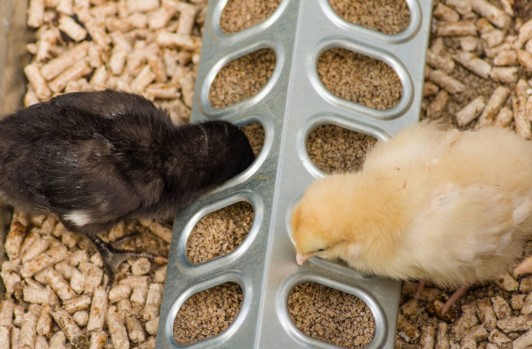
It is no secret that the poultry industry has experienced significant growth and evolution over the years. One of the most notable developments in recent times is the widespread use of medicated chicken feed. This type of feed contains antibiotics or other medications designed to prevent or treat diseases in chickens, which are commonly affected by a range of bacterial infections.
Understanding medicated chicken feed requires an appreciation of its composition and how it works within a bird’s digestive system. In this article, we will explore what medicated chicken feed is, why it is used, and how it functions to keep birds healthy. We will also examine the potential benefits and drawbacks associated with using medicated feed as well as alternative approaches to promoting good health among chickens. Through this discussion, readers can gain a better understanding of this important aspect of modern poultry farming practices.
Table of Contents
The Composition Of Medicated Chicken Feed
As chickens are raised in large numbers for commercial purposes, their health and productivity become crucial factors that need to be taken into account. One way of ensuring this is by incorporating medication into their feed. Medicated chicken feed consists of a combination of drugs, vitamins, minerals, and other additives to promote the well-being of these birds.
The composition of medicated chicken feed varies depending on the specific needs of each flock. Antibiotics such as tetracycline or penicillin may be added to prevent bacterial infections while antifungal agents like amphotericin B or clotrimazole can help control fungal growth. Vitamins A, D3, E, and K are also commonly included to strengthen bones and support healthy immune function.
In addition, mineral supplements such as copper sulfate or zinc oxide play an essential role in maintaining good skin health and improving digestion. These components work together synergistically to ensure optimal nutrition and overall health for the animals. Understanding how these ingredients interact with one another is vital when formulating medicated feeds tailored towards meeting the unique nutritional requirements of different flocks.
How Medications In Chicken Feed Work
As discussed in the previous section, medicated chicken feed is composed of various medications that are added to the regular feed. These medications can be antibiotics, coccidiostats or other drugs that help prevent and treat diseases in chickens. However, it’s important to note that these medications aren’t intended as a substitute for good poultry management practices.
To understand how medication in chicken feed works, it’s essential to know why they are used. Chickens raised on small farms may not require them because their living conditions often allow for fewer disease outbreaks than industrial settings where large numbers of birds live close together. In such cases, medication prevents infections from spreading among animals quickly by stopping bacteria growth before it becomes harmful.
The effectiveness of medicated chicken feed depends on several factors such as dosage, timing and type of drug administered. Some drugs work well against specific types of bacteria while others have broader spectrum activity but may also lead to resistance if overused. Ultimately, using medicated feeds should be done with caution and under veterinary supervision to ensure safe and effective use.
While there are benefits associated with using medicated chicken feed, there are also some drawbacks worth considering.
Benefits And Drawbacks Of Using Medicated Feed
Medicated feed has been widely used in the poultry industry to prevent and treat diseases. There are several benefits of using medicated feed, such as reducing mortality rates, improving growth performance, and minimizing the need for antibiotics. Medicated feed contains a low level of medication that can control various bacterial infections and parasitic infestations.
However, there are also some drawbacks associated with the use of medicated feed. One major concern is antibiotic resistance development in both animals and humans. The overuse of antibiotics in animal production can lead to the emergence of antibiotic-resistant bacteria that can spread to humans through food consumption or direct contact with animals. Furthermore, continuous exposure to medication may decrease its effectiveness over time, making it less useful when needed most.
Overall, while medicated feed can be a valuable tool in preventing and controlling disease outbreaks in chickens, it should only be used under veterinary supervision and proper management practices to avoid potential risks such as antibiotic resistance development.
As an alternative approach to chicken health, preventive measures such as vaccination programs and biosecurity protocols have gained increasing attention from farmers and researchers alike. These approaches aim at reducing disease incidence by limiting pathogen transmission between birds or from external sources. In addition, dietary interventions like probiotics and prebiotics have shown promising results in promoting gut health and boosting immunity without relying on medications. By combining different strategies tailored to specific farm conditions and needs, farmers can achieve better overall flock health outcomes while minimizing negative impacts on human health and the environment.
Alternative Approaches To Chicken Health
While medicated chicken feed can be effective in preventing and treating diseases, there are alternative approaches that poultry farmers may find beneficial. One such approach is implementing a vaccination program for the flock. Vaccines work by introducing a small amount of disease-causing agents into the bird’s system, which triggers an immune response without making them sick. This helps build immunity against diseases and reduces the likelihood of outbreaks among birds.
Another way to support chicken health is through proper hygiene practices on the farm. Keeping coops clean and well-ventilated can prevent the buildup of harmful bacteria and parasites that cause infections. Regularly cleaning waterers and feeders also ensures that birds have access to fresh food and water, reducing their risk of illness.
Lastly, providing chickens with a balanced diet rich in essential nutrients can help maintain their overall health. Supplementing their diet with natural additives like garlic or oregano has been shown to boost immune function and reduce stress levels among birds. Additionally, allowing chickens access to pasture or outdoor areas where they can forage for insects and plants provides them with additional nutrition while also keeping them active.
Moving forward, it is important for poultry farmers to consider these alternative approaches alongside medicated chicken feed when developing a comprehensive plan for maintaining optimal bird health. By taking a multifaceted approach, farmers can ensure healthy flocks while minimizing reliance on antibiotics and other medications. In the next section, we will discuss best practices for using medicated chicken feed as part of an integrated flock management strategy.
Best Practices For Using Medicated Chicken Feed
Alternative approaches to chicken health have been gaining popularity in recent years, with many farmers opting for natural remedies over traditional medication. However, when it comes to preventing diseases and promoting growth, medicated chicken feed remains one of the most effective solutions available.
Medicated chicken feed is formulated with antibiotics or other medications that help prevent bacterial infections such as coccidiosis and necrotic enteritis. These conditions can be devastating for flocks, leading to decreased productivity and even death. By incorporating medication into their diet, chickens can receive a consistent dose of preventative medicine without having to rely on individual treatments.
To ensure the best results from using medicated chicken feed, there are several best practices that farmers should follow. First and foremost, it’s important to choose the right type of feed based on the age and needs of your flock. Additionally, proper storage and handling procedures must be followed to prevent contamination and degradation of the medication. Farmers should also monitor their flocks closely for any signs of illness or adverse reactions to the medication.
Overall, while alternative approaches may have their merits, medicated chicken feed remains an essential tool in maintaining healthy and productive poultry flocks. By following best practices and working closely with veterinarians or animal nutritionists, farmers can ensure that they are making informed decisions about what is best for both their animals’ well-being and their own bottom line.
Conclusion
Medicated chicken feed is a common practice in the poultry industry, aimed at preventing and treating diseases. The composition of medicated feed includes antibiotics, coccidiostats, and other medications that help to boost immunity and prevent infections. These medications work by targeting specific pathogens or parasites that affect chickens’ health. While there are many benefits to using medicated feed, including improved growth rates and reduced mortality rates, it can also have drawbacks such as antibiotic resistance and residues in eggs and meat.
Alternative approaches to chicken health include organic farming methods, vaccination programs, proper nutrition management, biosecurity measures, and natural remedies. However, these alternatives may not be as effective as medicated feed when it comes to disease prevention and treatment. Therefore, farmers must weigh the pros and cons of each approach before making a decision.
In conclusion, understanding medicated chicken feed is crucial for anyone in the poultry industry. It provides an effective way to ensure healthy flocks while reducing economic losses due to illnesses. Nevertheless, we need to use this tool responsibly by following best practices such as correct dosage administration and withdrawal periods. In doing so, we will preserve its effectiveness while avoiding risks associated with overuse or misuse of medication on our farms. Just like how our bodies require medicine from time-to-time to stay healthy; medicated chicken feeds serve as potent prescriptions for maintaining healthy bird populations!





